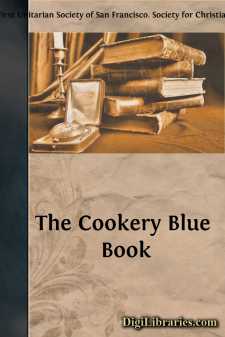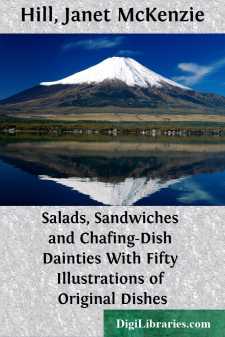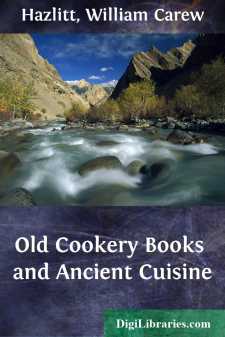Cooking
- General 70
- History 1
- Reference 10
- Regional & Ethnic 3
- Vegetarian 10
Cooking Books
Sort by:
SOUPS. Bouillon Soup. 4 pounds of round of beef cut into dice pieces. Trim off all fatty skin. 4 quarts water; 1 teaspoonful celery seed; 4 large onions; 6 large carrots; bunch of parsley; 6 blades of mace; 16 whole cloves, salt and pepper to taste. Pour on the water, and let it simmer six hours, skimming carefully, for if any grease is allowed to go back into the soup it is impossible to make it...
more...
There is positive need of more widespread knowledge of the principles of cookery. Few women know how to cook an egg or boil a potato properly, and the making of the perfect loaf of bread has long been assigned a place among the "lost arts." By many women cooking is considered, at best, a homely art,—a necessary kind of drudgery; and the composition, if not the consumption, of salads and...
more...
BREADS, BISCUITS AND ROLLS Dr. Price's Baking Powder may be used instead of yeast to leaven bread. It does precisely the same work; that is, raises the dough, making it porous and spongy. The great advantage of bread made by this method is in time saved, as it can be mixed and baked in less than two hours. Milk bread needs little or no shortening, and less flour is required than when water is...
more...
COOKED FISH Canapés Cold boiled fish makes excellent canapés. To each half pint of fish allow six squares of toasted bread. If you have any cold boiled potatoes left over, add milk to them, make them hot and put them into a pastry bag. Decorate the edge of the toast with these mashed potatoes, using a small star tube; put them back in the oven until light brown. Make the fish into a creamed fish. Rub...
more...
THE EARLY ENGLISHMAN AND HIS FOOD. William of Malmesbury particularly dwells on the broad line of distinction still existing between the southern English and the folk of the more northerly districts in his day, twelve hundred years after the visit of Caesar. He says that they were then (about A.D. 1150) as different as if they had been different races; and so in fact they were—different in their...
more...
by:
Various
PREFACE The recipes in this little book have been sent by Belgian refugees from all parts of the United Kingdom, and it is through the kindness of these correspondents that I have been able to compile it. It is thought, also, that British cooking may benefit by the study of Belgian dishes. The perfect cook, like Mrs. 'Arris or the fourth dimension, is often heard of, but never actually found, so...
more...
by:
Helen Campbell
Introductory. That room or toleration for another "cook-book" can exist in the public mind, will be denied at once, with all the vigor to be expected from a people overrun with cook-books, and only anxious to relegate the majority of them to their proper place as trunk-linings and kindling-material. The minority, admirable in plan and execution, and elaborate enough to serve all republican...
more...
by:
Anonymous
Medicines made of Lemmons. To take away the Spots, or red Pimpels of the face. Take halfe a pint of raine water, and halfe a pint of good Verjuice, seeth it till it be halfe consumed, then whilst it boils fill it up againe with juyce of Lemmon, and so let it seeth a pretty while; then take it from the fire, and when it is cold put to it the whites of four new laid Eggs, well beaten, and with this water...
more...
Luncheon Giving To give a luncheon is to indulge one's self in the most charming and satisfying form of entertaining. All the dignity of the stately dinner-party is lacking, it is true, but all the delight of informality is present; one has opportunity and leisure to chat, to laugh, and to discuss the dainty and unsubstantial dishes beloved of women. That hostess is to be congratulated who can and...
more...
HINTS FOR MEALTIME How often do we hear women exclaim, "Oh dear, what shall I have for the next meal?" This little book will aid you in answering that troublesome question. The recipes are carefully selected and we hope you will find them helpful. More important to you than the question of food is that of health. Therefore, in this book we show you many letters from women who have received great...
more...











